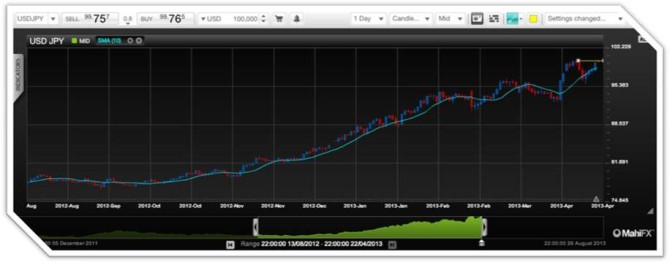The G20 meeting held on April 18-19 clearly aimed to delink quantitative easing measures with currency wars and instead focused on how they will stimulate economic growth and jobs creation. But in the real world QE will remain a source of market distortion and international tension.
The Japanese probably emerged as the biggest victors from the G20 conference as they were effectively given a green light for their aggressive monetary stimulus policies, which are likely to devalue JPY further.
By Justin Pugsley, Markets Analyst MahiFX.
This is being tolerated on the basis that a growing Japanese economy will do far more good to the world than the negative effects of a weak currency.
Japan first started using QE back in 2001, mainly to help the banking sector cope with the country’s huge deflating asset bubbles, but relative to recent UK and US actions, its efforts were modest. In terms of the scale of QE Japan is now catching up in quick time with the US and UK in the context of using it to stimulate GDP growth.
However, it is unclear whether Japan’s re-inflation programme will do much more than stimulate some temporary growth though it has proved a powerful tonic for its stock market. It’s a dangerous monetary experiment where the end consequences are unclear, but also a sign of desperation on the part of Japanese policy makers as they try to figure out how to deal with their country’s huge public debts.
More priority on economic growth
The G20 reinforced the commitment to the creation of jobs and growth and tolerating Japan’s stimulus efforts even with a weaker currency also allows plenty of scope for other countries to pursue aggressive monetary policies if they deem it necessary. Indeed, the G20 will simply be “mindful of unintended negative side effects stemming from extended periods of monetary easing.”
With the IMF foreseeing slower global growth, the scene could be set for more rounds of QE from other countries, in particular the UK and maybe even the US if sequestration starts to sap private sector consumption. It’s possible that even the European Central Bank could eventually move towards QE type policies, particularly if the German economy is hit by recession.
Another notable from the G20 event was to put off the day that governments running large fiscal deficits try to put their books in order. Indeed, ‘austerity’ is becoming something of a dirty word given Europe’s experience with it, which in many ways mirrors attempts by governments during the 1930s to balance their books, which helped prolong the Great Depression.
China liberalisation could be speeded up
Also, of interest is China’s move to widen the trading bands for its currency and liberalising the CNY could be speeded up. A free floating Chinese currency – if and when it happens – would be a very significant addition to forex markets given China is the world’s second largest economy. It would no doubt quickly move to becoming a major reserve currency and would support China becoming a major financial centre. USD/CNY would also become one of the most heavily traded currency pairs.
However, it was clear that there is plenty of tension simmering not that far beneath the surface at the G20. South Korea is still very unhappy over Japan’s re-inflation policies and there is deep division between the US and Germany over fiscal policy. Many emerging market countries with more robust economies remain concerned over the distorting effects of aggressive QE activity from developed nations.

